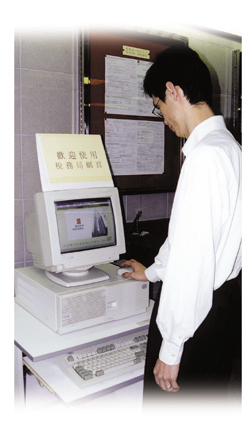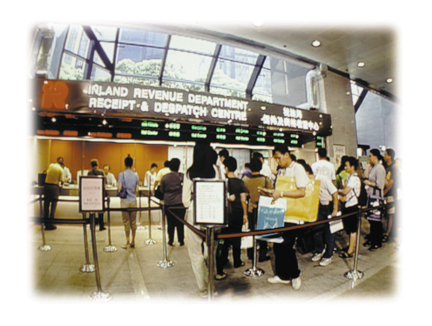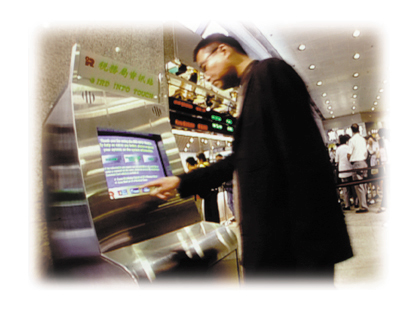 In her recent letter to Finance
Bureau, the Acting Commissioner of Inland Revenue, Mrs. Agnes SIN, shares with us her
experience in the Inland Revenue Department where EPP savings are achieved alongside with
continued improvements in service standards and efficiency. She also gives her views on
further devolution of resource management authority from the centre to Controlling
Officers. In her recent letter to Finance
Bureau, the Acting Commissioner of Inland Revenue, Mrs. Agnes SIN, shares with us her
experience in the Inland Revenue Department where EPP savings are achieved alongside with
continued improvements in service standards and efficiency. She also gives her views on
further devolution of resource management authority from the centre to Controlling
Officers. EPP vs Service ImprovementsThe Inland Revenue Department has no difficulty in meeting the EPP target in 2000-2001, which entails a saving of $11.8 million of our operating budget. In the Department, EPP savings are achieved alongside with visible and quantifiable improvements in service standards. Notwithstanding resource constraints, we have embarked upon a range of new initiatives to enhance the quality of our services to the taxpayers in 2000 - 2001 by means of, inter alia, the application of new technology. To quote a few examples -
On-going Business Process Re-engineeringIn addition to office automation and use of new technology, we pursue
EPP through on-going review of Engaging StaffAll EPP initiatives need the support of a committed, motivated and engaged workforce. In a bid to develop staff commitment to and ownership of our initiatives, the Department has put in a lot of efforts to cascade the message to staff through various channels, including the formal staff consultative committees as well as the regular informal meetings between front-line staff with designated line managers. Recently we have launched a new "Excellent Service Programme" to further encourage staff participation in our EPP efforts. Officers particularly those in the frontline form various Excellent Service Teams. Drawing on first hand experience and knowledge from their day-to-day encounters with the customers, members of these teams would be in a good position to contribute practical and creative proposals to simplify and refine tasks and procedures which can meet the needs of the customers. An enabling environmentEfficiency and productivity can be enhanced if Controlling Officers are given more flexibility in the deployment and management of resources under their control. It is appreciated that in recent years the resources bureaux at the centre have taken positive steps towards this direction. These include, for example, in the area of human resource management, the delegation of authority to the Department over a range of matters, simplification of appointment/recruitment procedures, introduction of greater flexibility in managing general grades staff, creation of posts at basic ranks without recourse to the resource bureaux, withdrawal of FB/CSB representatives from the Departmental Establishment Committee for creation of posts at promotion ranks and the employment of non-civil service contract staff. In addition, the centre has liberalised a host of rules and regulations governing the provision of "common services", such as printing, procurement, Government transport, accommodation etc. This gradual retreat from the micro-management approach by the various common service providers has created an enabling environment for us at the departmental level to achieve savings and efficiency. For instance, we can now obtain more speedy printing services for minor printing jobs, usually at more competitive prices from outsourcing. In the past, the over-regulated common services provided within the civil service posed considerable constraint on our already stretched managers. I must therefore acknowledge the centre's "de-regulation" efforts in helping us to respond more readily to our urgent operational needs. Can the centre do moreThe devolution of authority and responsibility from the centre to
Controlling Officers has a positive impact on government's overall EPP initiative. This
can be a continuing process as there is still scope for further delegation of authority
and greater flexibility. One suggestion is to regularly review the control over the
provision of "common services" in the light of feedback from the user
departments. To achieve the EPP targets and to meet the need to contain the size of the civil service, we anticipate that we may resort to the outsourcing of some of the Department's activities and the engagement of more temporary staff to deliver services. The present compartmentalised control over operating expenditure under the PE and DE subheads is not conducive to flexible redeployment of resources. We therefore look forward to the extension of the one-line vote arrangement to the Inland Revenue Department. To better prepare the civil service for the challenges ahead, it is necessary for all of us, those at the departmental level and the resource bureaux at the centre to be more flexible, forward looking and proactive. To this end, we hope that the centre would continue its laudable role as a "facilitator" and a "strategic planner". |
||||||
 our operation with a view to re-inventing and streamlining our structure and
procedures. A more recent initiative is the merging of the Investigation Unit and the
Field Audit Group in April 2000. Apart from saving some staff costs and administrative
overheads, the merger will achieve synergy and increase operational efficiency through
elimination of duplicated efforts and sharing of information/experience amongst fellow
officers. In the coming year, we will launch another major business process re-engineering
exercise to facilitate redeployment of our limited resources to meet the ever-increasing
demands for new and improved services.
our operation with a view to re-inventing and streamlining our structure and
procedures. A more recent initiative is the merging of the Investigation Unit and the
Field Audit Group in April 2000. Apart from saving some staff costs and administrative
overheads, the merger will achieve synergy and increase operational efficiency through
elimination of duplicated efforts and sharing of information/experience amongst fellow
officers. In the coming year, we will launch another major business process re-engineering
exercise to facilitate redeployment of our limited resources to meet the ever-increasing
demands for new and improved services. 
